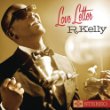A return to old school fanfare seems to be the wisest decision for R. Kelly after Untitled, his ninth studio album, went nowhere fast. Hoping to regroup and reclaim his prominence in R&B, Kelly presents himself as a smooth talking gentleman on Love Letter, a homage dominated with classic ‘60s and ‘70s soul. The album easily abandons the "bump and grind" mystique of his signature contemporary sound and the raunchy explorations of Untitled in exchange for a subdued restraint loaded with ballroom romanticism and apologetic pleading. It's a generous disc for the R&B crooner, although mildly predictable at times. Even though he momentarily echoes latter-day R&B using the epic balladry of Michael Jackson ("Taxi Cab," "Not Feeling the Love") and then curtailing towards simmering Aaliyah vibes ("Number One Hit"), Kelly opts to ride in the slow lane of Marvin Gaye/Jackie Wilson-era R&B for the most part.
A return to old school fanfare seems to be the wisest decision for R. Kelly after Untitled, his ninth studio album, went nowhere fast. Hoping to regroup and reclaim his prominence in R&B, Kelly presents himself as a smooth talking gentleman on Love Letter, a homage dominated with classic ‘60s and ‘70s soul. The album easily abandons the "bump and grind" mystique of his signature contemporary sound and the raunchy explorations of Untitled in exchange for a subdued restraint loaded with ballroom romanticism and apologetic pleading. It's a generous disc for the R&B crooner, although mildly predictable at times. Even though he momentarily echoes latter-day R&B using the epic balladry of Michael Jackson ("Taxi Cab," "Not Feeling the Love") and then curtailing towards simmering Aaliyah vibes ("Number One Hit"), Kelly opts to ride in the slow lane of Marvin Gaye/Jackie Wilson-era R&B for the most part.
Vocally, "When a Woman Loves" is Kelly's strongest suit, pulling off rapid takeoffs into his falsetto and powerhouse belting summoning the heart of a gospel singer, but the shortcomings of the song structure tends to reveal itself easily. The doo-wop vibes are distinctively traceable of the Penguins' "Earth Angel" and the lyrics are simply revisions of Percy Sledge's "When a Man Loves a Woman." The knee-bending pleas are so weakly conceived that an old school mack would rate its one-liners as pre-school gibberish, calling Kelly one very lucky man or the female one whipped, insecure lady: "She took me back after I broke her heart a thousand times."
Kelly excels the most in his confident phrasing, while singing against a favorable retro-styled production. Like Kelly did with "Step In the Name of Love," "Just Can't Get Enough" and the album's title track digs deep into breezy Quiet Storm mid-tempo conventions. "Love Letter" feels the most authentic; matching Kelly's own artistry without feeling like a deliberate copy of familiar musical influences. The concocting beats are also a perfect match for Kelly's rhyming style, resembling the sentimental adages of Hammerstein's "My Favorite Things." He gingerly sings of "sweet dreams, butterflies, holding hands side by side" with a dash of innocence. It's probably a mild quibble to discover the bonus Christmas version, with its revised seasonal lyrics, lyrically trumping the original, but it isn't the kind of oddity to typically pout about. "Radio Message" mixes doo-wop with melodic ripples of Charlie Wilson's "There Goes My Baby" while K. Michelle guests with the Pied Piper on "Love Is," piecing together a duet simulation of Marvin Gaye and Tammi Terrell.
The biggest gripe on Love Letter can be summed up in some of its technicalities. The keyboard designed horns feel trite and listless, even hurting the opening moments of "When a Woman Loves." Kelly's compositions can be simple at times, with lots of excessive looping and lyrical repetitiveness. "Number One Hit" and the title track are just some of the obvious examples. When he takes on golden-era Motown with "Love Is," it feels generic. And, when flashback influences tend to overtake Kelly, it feels like plagiarism in the worst degree, like with "Music Must Be A Lady," which unashamedly copies the foreplay of Marvin Gaye's "Just to Keep You Satisfied."
But, Kelly should be praised for his humble retreat to vintage soul. It's not the most popular department in Kelly's music catalog, but it's where a semi-old G with his kind of talent and virtuosity needs to travel. Although he's a bit more interesting and entertaining on the horny R-rated escapades, Kelly knows his only way to securing a place in R&B royalty is to place more emphasis on persuasive phrasing and timeless melodies in favor of the cheap, easy-to-assemble club-embossed beats. Love Letter proves he's on the right road heading in the right direction, but he's possibly driving the wrong vehicle. Modestly recommended.
By J Matthew Cobb

